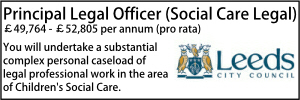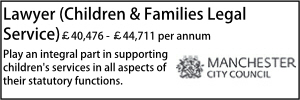

The final say
News
Must read
Families refusing access to support
Features Test

Producing robust capacity assessments and the approaches to assessing capacity

Disability discrimination and proportionality in housing management

Cross-border deprivation of liberty

Dealing with unexplained deaths and inquests

Court of Protection case update: May 2025
Features

Producing robust capacity assessments and the approaches to assessing capacity

Disability discrimination and proportionality in housing management

Cross-border deprivation of liberty

Dealing with unexplained deaths and inquests

Court of Protection case update: May 2025
Sponsored articles
What is the role of the National Trading Standards Estate & Letting Agency Team in assisting enforcement authorities?
Webinars
Is Omeprazole the new EDS?
More features
Provision of same-sex intimate care
Court of Protection case update: April 2025
High Court guidance on Article 3 engagement in care at home cases
‘Stitch’, capacity and complexity
Issuing proceedings in best interests cases
Court of Protection case law update: March 2025
The Health and Social Care (Wales) Bill Series – Regulation and Inspection of Social Care
The Health and Social Care (Wales) Bill Series – Direct Payments for NHS Continuing Healthcare
What is the right approach to Care Act assessments?
Disabled people in immigration bail: the duties of the Home Office and local authorities
Capacity, insight and professional cultures
Court of Protection update: February 2025
Setting care home fees
Could this be the end for local authority-provided residential care?
“On a DoLS”
It’s all about the care plan
Court of Protection case update: January 2025
Mental capacity and expert evidence
Best interests, wishes and feelings
Capacity, sexual relations and public protection – another go-round before the Court of Appeal
Court of Protection Update - December 2024
Fluctuating capacity, the “longitudinal approach” and practical dilemmas
Capacity and civil proceedings
Recovering adult social care charges via insolvency administration orders
Court of Protection case update: October 2024
Communication with protected parties in legal proceedings
The way forward for CQC – something old, something new….
The Ombudsman, DoLS and triaging – asking the impossible?
Outsourcing and the Human Rights Act 1998 – the consequences
Commissioning care and support in Wales: new code of practice
Reports of forced marriages involving male victims rise 65%
- Details
Reports of men becoming victims of forced marriages rose 65% in 2009, according to the government's Forced Marriage Unit.
The FMU, which is run jointly by the Home Office and the Foreign and Commonwealth Office, said it had received more than 220 emails and calls to its helpline about forced marriages involving male victims. This compared to 134 in 2008.
The majority of victims of forced marriage are women. Some 86% of the 1,682 cases that the FMU – which was set up in 2005 to provide support for victims and expert training and guidance for professionals – gave advice on involved females.
However, the Home Office said that men could be forced into marriage for a range of reasons, including family commitments and expectations, the need to secure a visa, or the desire to control behaviour and protect a family’s reputation.
Male victims are often forced into marriage because their families know or suspect they are gay or bisexual.
James Brokenshire, minister for crime prevention, said: “Forced marriage is a form of domestic abuse and will not be tolerated. These figures are proof that both men and women are victims of forced marriage, so it’s vitally important that we encourage those who work with young people to contact the forced marriage unit if they have any concerns, and that victims who have been affected come forward and get the help they need.”
Male and female victims of forced marriage – or others acting on their behalf – can apply for a forced marriage protection order. This can prevent someone being forced into marriage or protect a person where a marriage has already taken place.
Some 150 orders have been taken out since the Forced Marriages Act came into force in November 2008.
Foreign Office minister Jeremy Browne said: “Boys and men who are forced into marriage find it harder to ask for help than women, but we are urging males affected by forced marriage to speak out and seek the help that is available to them.”
Research last year suggested that local authorities were reluctant to use the powers given to them by the Forced Marriages Act.
The FIPs don't work, says leading academic
- Details
Family intervention projects (FIPs) were not the success in the last decade that the Labour government claimed, according to a report published by the Centre for Crime and Justice Studies.
Professor David Gregg, the report’s author, suggested there was little evidence supporting Labour’s views of its flagship anti-social behaviour policy.
He said successive evaluation teams included large caveats to claims of project success but the government ignored these in media statements and other public policy announcements.
The claimed success rates for FIPs were based only on a core sample of the families that were most compliant, he added.
Gregg’s report, Family Intervention Projects: a classic case of policy-based evidence, “seriously questioned” whether ASB interventions were appropriate for people who often have mental health problems, learning disabilities or neurological disorders.
These problems aside, most of the FIP families tended to conform to the norms and values of the communities in which they lived, the report said.
Prof. Gregg said: “I was struck again and again during my analysis of the research by how weak is the evidence base for the claimed success of the Family Intervention Project strategy.”
He added: “By targeting the wrong people for the wrong reasons while failing to tackle the underlying causes in those targeted or delivering support in key areas like mental health the FIP remains at root enforcement-led and sanctions oriented, where someone must be blamed and punished for bad behaviour.
“This ethos justifies forcing very vulnerable families with mental health problems into projects under threat of eviction, loss of benefits and removal of children into care.”
Richard Garside, director at the Centre for Crime and Justice Studies, called for a review of the FIP strategy. "This briefing raises serious questions about the efficacy of these projects," he said.
High Court issues key ruling on powers of councils in relation to incapacitated adults and children
- Details
The High Court has delivered a key ruling on the extent of local authorities’ powers in relation to incapacitated children and adults.
In A Local Authority v A (A Child) & Anor [2010] EWHC 978 (Fam), a nine-year-old child (A) and a 22-year-old adult (C) in the same local authority both suffered from Smith Magenis Syndrome.
The syndrome produces behavioural problems such as self harm, physical and aggression, hyperactivity, destructive behaviour and severe sleep disturbances, which include frequent and prolonged night waking and early morning waking.
Lord Justice Munby said the parental care given at home by the parents was “devoted and exemplary”, adding that there is “nothing which even begins to suggest any proper basis for compulsory intervention in the lives of the families”.
Despite the different legal context – reflecting the different regimes for children and incapacitated adults – the issue was the same: Do the circumstances of their care by their families – they were both locked in their bedrooms at night to keep them safe – involve a deprivation of liberty engaging the protection of Article 5 of the European Convention on Human Rights (the right to liberty and security)? And what, if any, role does the local authority have in such cases?
In both cases, the judge accepted the recommendations of medical experts, A’s guardian ad litem and C’s social worker that keeping them locked in the bedroom at night was in their best interests, and that they were at more risk of harm if the door was open. Alternatives such as a night-time carer would have significant disadvantages, principally because it would disturb A and C’s sleep pattern.
Lord Justice Munby ruled that where a local authority “knows or ought to know that a vulnerable child or adult is subject to restrictions on their liberty by a private individual, then its positive obligations under Article 5 will be triggered”.
On the nature of these obligations, the judge said:
- They include the duty to investigate, so as to determine whether there is, in fact, a deprivation of liberty. In this context the local authority will need to consider all the relevant factors, both objective (in terms of the nature of the confinement) and subjective (whether the individual has validly consented to the confinement).
- If, having carried out its investigation, the local authority is satisfied that the objective element is not present, so there is no deprivation of liberty, the local authority will have discharged its immediate obligations. However, its positive obligations may in an appropriate case require the local authority to continue to monitor the situation.
- If, however, the local authority concludes that the measures imposed do or may constitute a deprivation of liberty, then it will be under a positive obligation, both under Article 5 alone and taken together with Article 14, to take reasonable and proportionate measures to bring that state of affairs to an end. What is reasonable and proportionate in the circumstances will depend upon the context, but it might require the local authority to exercise its statutory powers and duties so as to provide support services for the carers that will enable inappropriate restrictions to be ended, or at least minimised.
- If, however, there are no reasonable measures that the local authority can take to bring the deprivation of liberty to an end, or if the measures it proposes are objected to by the individual or his family, then it may be necessary for the local authority to seek the assistance of the court in determining whether there is, in fact, a deprivation of liberty and, if there is, obtaining authorisation for its continuance.
Ruling that parents remain in control of how they bring up their dependents, Lord Justice Munby said: “What emerges from this is that, whatever the extent of a local authority’s positive obligations under Article 5, its duties, and more important its powers, are limited.
“In essence its duties are threefold: a duty in appropriate circumstances to investigate; a duty in appropriate circumstances to provide supporting services; and a duty in appropriate circumstances to refer the matter to the court.”
The judge suggested that a “key message” was that whatever the positive obligations of a local authority under Article 5 may be, “they do not clothe it with any power to regulate, control, compel, restrain, confine or coerce. A local authority which seeks to do must either point to specific authority for what it is doing – and….such statutory powers are, by and large, lacking in cases such as this – or obtain the appropriate sanction of the court”.
Lord Justice Munby added that local authorities should approach investigations with sensitivity and a proper appreciation of the limited extent of their powers. He also warned that “too often” local authorities applied ex parte (without notice) to remove incapacitated or vulnerable adults from their carers.
He added that too often the courts granted such orders when the “seeming heavy handedness is not easy to justify and can too often turn out to be completely counter-productive”.
John Wadham, group legal director at the EHRC, which intervened in the case, said: “This is an important case about the limit of the power of local authorities. It provides a timely reminder that only in exceptional circumstances can authorities override the decisions of loving parents.”
Law Commission to fast-forward review of adult social care law
- Details
The Law Commission is to speed up its review of adult social care law, after the government asked it to bring the timetable for its final report forward.
The government’s advisory body on law reform has now agreed to publish its conclusions by the end of April 2011.
The move will co-ordinate better with the timetable for the Commission on adult social care funding, which is expected to report within a year. It will also give greater flexibility over the timing of legislation to implement the Law Commission’s recommendations.
The Law Commission, which had originally planned to report in the summer of 2011, launched its consultation on proposals for a single statute for adult social care law in February.
It believes that reform could save local authorities £15m in litigation costs and social worker time. The advisory body has stressed that it does not intend to create new duties for councils.
Frances Patterson QC, the Law Commissioner leading the project, said at the time that the existing system caused confusion, delay and inconsistency.
The deadline for submitting responses to the Law Commission’s consultation is 1 July 2010.
See also: It's time to reform community care law.
Leading refugee charity goes into administration, blames late payment of legal aid
- Details
A charity that helps refugees has claimed that late payment of legal aid forced it into administration on Tuesday (15 June).
Refugee and Migrant Justice said this would leave some 10,000 people without access to a lawyer.
It called in administrator BDO citing “a cash flow problem created by late payment of legal aid by the Legal Services Commission”.
A campaign led by the Archbishop of Canterbury, Dr Rowan Williams, and supported by civil rights lawyer Sir Geoffrey Bindman, and Julie Bishop, chief executive of the Law Centres Federation, had tried to persuade the Ministry of Justice to intervene to save the charity.
RMJ’s chair Paul Gray said: “It is with great sadness that trustees took the decision to put RMJ into administration.
“It is a brilliant charity which has a justifiably high reputation for the quality of support it gives and we are very concerned about the position of our 10,000 clients, and of our dedicated and highly professional staff.”
He said legal aid payments had been delayed by up to two years and called on the LSC to “immediately to discuss with the administrators how best to minimise the distress and disruption to our clients during what will inevitably be a difficult transition process”.
Gray said a freedom of information request to the Legal Services Commission had revealed that some “asylum providers, doing the minimum possible to advance their clients’ cases, are making massive profits. While this has gone unchecked, quality representatives such as RMJ who spend time with their clients to complete cases are being starved of cash.”
RMJ, formerly the Refugee Legal Centre, was established in 1992 and said it had helped more than 110,000 people since then.
A Ministry of Justice spokesperson said it appreciated RMJ’s work and had given it substantial support to transfer to the current legal aid payment system.
“However, it is also crucial that the government achieves value for public money,” he said. “The fixed fee system introduced three years ago is already being successfully used by the vast majority of not-for-profit organisations in this area of law. As other organisations have successfully made this transition, it is only reasonable to expect Refugee and Migrant Justice to do the same.”
May suspends launch of vetting and barring scheme, pending wholesale review
- Details
The Home Secretary Theresa May has announced that the government will suspend the introduction of the vetting and barring scheme – which was set to begin next month – and launch a review of the programme with the aim of scaling back the “draconian” regime.
The scheme was developed by the previous government in response to the the murders of two schoolgirls in Soham and would have required up to nine million adults working with children and vulnerable adults in England, Wales and Northern Ireland to register. Registration was due to begin on 26 July.
The government's review is set to significantly reduce the scope of the scheme to what May described as “common sense” levels.
May told the BBC: "You were assumed to be guilty until you were proven innocent, and told you were able to work with children. All sorts of groups out there were deeply concerned about this and how it was going to affect them. There were schools where they were very concerned that foreign exchanges could be finished as a result of this, parents were worried about looking after other people's children after school."
Children’s Minister Tim Loughton said: "Protecting vulnerable children is a top priority. Any vetting system should not be a substitute for proper vigilance by individuals and society. At the moment we think the pendulum has swung too far. We shouldn’t be driving a wedge between children and well-meaning adults including people coming forward to volunteer with young people. Such individuals should be welcomed, encouraged, and helped as much as possible, unless it can be shown that children would not be safe in their care."
The Independent Safeguarding Authority, which was set to run the vetting and barring scheme, will continue to maintain existing lists of people barred from working with children and vulnerable adults and make decisions about barring inappropriate people from jobs, while the existing requirements for criminal record checks will still apply. The measures to expand the scope of checks on people working with children and vulnerable adults introduced in October last year, remain in place.
It remains a criminal offence for barred individuals to apply to work with children or vulnerable adults in the wider range of posts introduced in October 2009. Employers also face criminal sanctions for knowingly employing a barred individual across a wider range of work and the two new barred lists administered by the ISA (which replaced the three previous barring lists: POVA, POCA and List 99) will remain. Checks of these two lists can be made as part of an Enhanced CRB check.
Additional jobs and voluntary positions are covered by the barring arrangements introduced in October 2009, including moderators of children's internet chat rooms, and a large number of NHS staff. Employers, local authorities, professional regulators and inspection bodies have a duty to refer to the ISA any information on an individual working with the vulnerable where they consider them to have caused harm or pose a risk.5. The latest information on the VBS can be found at www.direct.gov.uk/vetting or www.businesslink.gov.uk/vbs.
Dai Durbridge, a safeguarding expert at Browne Jacobson solicitors said that whilst the review is a major step, it was questionable whether it goes far enough.
He said: “There is little doubt that the registration requirements impacted upon too many people, but the management of the information held by the ISA and its role in barring individuals also requires review. A failure to automatically tell employers when their staff are barred and an extremely low threshold for when employers are under a legal obligation to refer conduct to the ISA are of serious concern to employers.”
Durbridge added: “If a review of the process is to be undertaken at all, then a full and thorough review of all aspects of the ISA’s role is in order.”
Page 264 of 270
Locums
Case Law Update

The final say
In association with...

Poll
in association with...

Events

Directory































